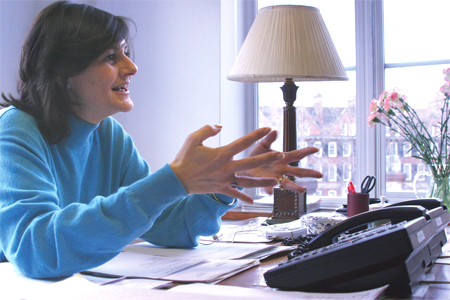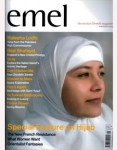
Table talk with Christina Odone
Issue 4 Mar / Apr 2004
"The irony is that Islam's principle tenets are exactly what traditional England loves. When Britons speak of a golden age, they are looking back at a time when Muslim norms would have been mirrored."
Cristina Odone is deputy editor of the New Statemen and regular contributor to the Guardian and Observer newspapers. Her career as a journalist involved a pioneering role as editor of the Catholic Herald from 1992 to 1996. As a practicing catholic Cristina is not afraid to uphold her beliefs. She talks to Samia Rahman about faith. Secularism and Catholicism's natural affinity with Islam.
Cristina Odone does not allow herself to be defined by others. From Editor of the Catholic Herald to Deputy Editor of the New Statesman, she has crossed the religious journalistic terrain with her faith intact and emboldened in the face of challenges. Facing challenges as a result of her faith is something she has grown used to, a contrast to the religious normality of her childhood. “Being a Catholic in Britain is different from being a Catholic in Italy where I grew up, and being a Catholic in America where I spent my middle years.
To be a Catholic in Italy was to be a part of the community – everybody is Catholic, unthinkingly, automatically. You are surrounded by Catholic churches, Catholic rituals, nuns and priests at every street corner. I never had to question it because when I was growing up in the 1960s everybody went to Church on Sundays and when discussing your identity, Catholicism was always a key ingredient, just as Islam is integral to the lives of those living in Muslim countries.” In the US Cristina found religion to be the domain of White Anglo Saxon Protestants (WASPS) and Catholicism was no longer infused in the environment. As a result “Catholicism became much more of a conscious decision.”
Her experiences in the UK have been quite different. “I came here to study at Oxford and immediately was made aware that being a Catholic in Britain was considered suspect. A boyfriend took me home to meet his wealthy Anglican parents. The meeting was odd and everyone was cold and awkward with me. Afterwards the boyfriend had to tell me that his mother really did not want us to get married because she feared all his money, and eventually her money would go to the Pope. I was in shock because we were only 18 and this is what was being discussed! We were a minority religion, and a suspect religion because our allegiances were considered not to be to the Crown but to the Pope. People would frequently bring this up and make me feel like an outsider.”
This suspicion was not confined to her personal life. “When I was interviewed for the job at the New Statesman, the first question Peter Wilby, the editor, put to me was, ‘Could you work with atheists?’”
The growing irrelevance of religion in Britain has lead many to be wary of faith. “The UK is such a secular society. In America God figures, but in the UK I was seen as strange because I went to Mass every day and admitted to praying.” Upon choosing to intermingle her religion with her career and opting to work at the Catholic Herald as a reporter she was, she says, “considered even more strange and people were falling about when I became editor.” Cristina set about breaking stereotypes and challenging preconceptions about Catholics. “It is one of the reasons why I gained a profile because the expectation was that the editor would be an Irish elderly man, possibly a former priest, certainly hooked on whisky and not someone who was female and under 30 as I was. People were unable to comprehend that someone of my age could see religion as interesting and exciting to explore.”
Cristina views faith as a strength, not a hindrance. “How many people with religion say their life is the poorer for being religious? No one. No matter how difficult their faith is.” And she concedes it is not always easy. “At present I am breaking one of my Church’s rules in that I am with a divorced man. This means I cannot take communion and the Church does not recognise my marriage, all of which is very difficult for me. And yet my life would be so much poorer if I did not have my faith.”
A strong sense of faith enables Cristina to relate to other religions and recognise the growing chasm between those with belief and those without. “I am convinced that the world is now divided between the secularists and the religious. It is more difficult to be a Muslim these days because the West feels so frightened of this religion that is vibrant and gaining in strength whilst other religions are on the whole on the decline. This is why I can read the Qur’an and be with my Muslim friends and discuss Islam because I recognise a force that has other people running scared.” She sees great advantage in “all religions building bridges and moving very close,” to ensure that religious freedoms are maintained.
The dismissive response of some in the West to Islam, Cristina feels, is borne out of a fear of what they do not understand. “The easiest way to denigrate something is to claim it is not democratic. If your first allegiance is to God then you are considered not to be part of this democratic process and you must find democracy inimical. Because religion is hierarchical, is about obedience, about submitting your will to another, for many that is really scary and is in conflict with what they understand democracy to be.” The misunderstanding occurs when Islam becomes identified with the politics of Muslim nations. “Religion is one thing and politics is another.
People are afraid of Islam because deeply entrenched in their memory is the Iranian theocracy. Where the Spanish have their Inquisition, the Muslims have their Rushdie affair and Ayatollah Khomeini.”
The French response to the “mad edict” on the headscarf illustrates such fear and ignorance. “The French are very anti-Muslim,” she comments. “I was sitting in a café in Paris with two Arab friends who incidentally were not Muslim, but were thrown such insults by people wrongly assuming they were Muslim. The incident is indicative of the fact that in this beautiful city where I heard Arabic being spoken everywhere the prejudice is against Islam.”
The consequence of the ban on the headscarf in schools is, according to Cristina, “segregation. They must repeal it before parents pull their children out of school. The French have always been anti-clerical and now in the 21st century, the church has been beaten and they need a new target – Islam.”
These are uncertain times, and the ‘other’ is everybody’s favourite scapegoat at a time of insecurity. “Everything is changing so fast,” Cristina observes, “the family unit, social services, the NHS, education, all are crumbling and people feel vulnerable so they find the easiest scapegoat - the one that looks different, whether by wearing the headscarf, a turban or a beard.” These insecurities are then exploited in the media. “For example, Robert Kilroy-Silk received overwhelming support because he perpetuated fears and untruths. The BBC were right to react so strongly and remove him.”
So how can Muslims subvert stereotypes and alleviate fears? “Through knowledge,” Cristina responds. “Spokespeople need to come forward who are enlightened and intelligent, not emotive or confrontational polemi- cists. The irony is that Islam’s principle tenets are exactly what traditional England loves. When Britons speak of a golden age, they are looking back at a time when Muslim norms would have been mirrored. Muslims need to ensure that non-Muslims understand Islam for what it is.”
The UK and US intervention in Afghanistan and Iraq has done little to assist understanding of Islam. “I fell very naturally under the Tony Blair of the Christian Socialist days. Here was a man who spoke of giving the voiceless a voice, the disadvantaged an opportunity, striving for the improvement of society. He cherished the idea of society being made up of family units and was intent on curbing the excesses of the consumer me-me-me individualistic society, the excesses of feminism, of a culture that had run amok with sex, drugs and decadence. But that is no longer the Tony Blair of today.” Her disillusionment is palpable. “It is depressing how he squandered so much goodwill. It is an extraordinary tale of power corrupting. I find it very dispiriting as I do not recognise the leftwing of the Labour party as my natural home, nor do I recognise the Conservatives as where I belong – I feel rather caught out.”
Cristina emphasises that religion and the left are uneasy bedfellows. “It is us and them. I delivered a lecture explaining why the left hates anybody with religion. It was published in the Guardian, and the Today programme did a debate on it. I received 150 hate emails that were so personal and nasty my husband had to erase them. The Guardian warned me of the expected response because they know their readers.” Why such a virulent backlash? “I said the chattering classes, especially the left-wing intelligentsia, espise anyone with faith. It is the left who see themselves as enlightened, progressive pioneers in the social arena, and they can’t bear anything that cherishes so-called old fashioned mores like the family and marriage. They regard all religion as antiwomen, anti-gay, anti-enlightenment, anti-democratic, anti-everything.”
When confronted with such accusations Cristina is not ambiguous in her response. “If I am asked to elaborate my views on controversial issues I simply say ‘love the sinner, hate the sin’. Close friends of mine are gay yet I find gay marriage difficult to accept. The notion that a child does not need its father I find hard. This is where the left and religion depart.” The left accuse religion of being narrow and simplistic but in fact “secularism is so much easier than having faith – no discipline, no delaying of your gratification, always thinking of yourself first. I would love to be a secularist, it would be wonderful – I just wouldn’t be able to sleep at night.”
Bookmark this |
|
Add to DIGG |
|
Add to del.icio.us |
|
Stumble this |
|
Share on Facebook |
|
Share this |
|
Send to a Friend |
|
Link to this |
|
Printer Friendly |
|
Print in plain text |
|


Comments
2 Comments
1
Ifti
16 Dec 10, 17:25
The British Government is planning to make it easier to schools to “opt out” from the Local Authorities. Muslim children in state schools feel isolated and confused about who they are. This can cause dissatisfaction and lead them into criminality, and the lack of a true understanding of Islam can ultimately make them more susceptible to the teachings of fundamentalists like Christians during the middle ages and Jews in recent times in Palestine. Fundamentalism is nothing to do with Islam and Muslim; you are either a Muslim or a non-Muslim.
There are hundreds of state primary and secondary schools where Muslim pupils are in majority. In my opinion all such schools may be opted out to become Muslim Academies. This mean the Muslim children will get a decent education. Muslim schools turned out balanced citizens, more tolerant of others and less likely to succumb to criminality or extremism. Muslim schools give young people confidence in who they are and an understanding of Islam.
2
Jaber
11 Oct 10, 12:10
A fantastic read. Really liked her views.